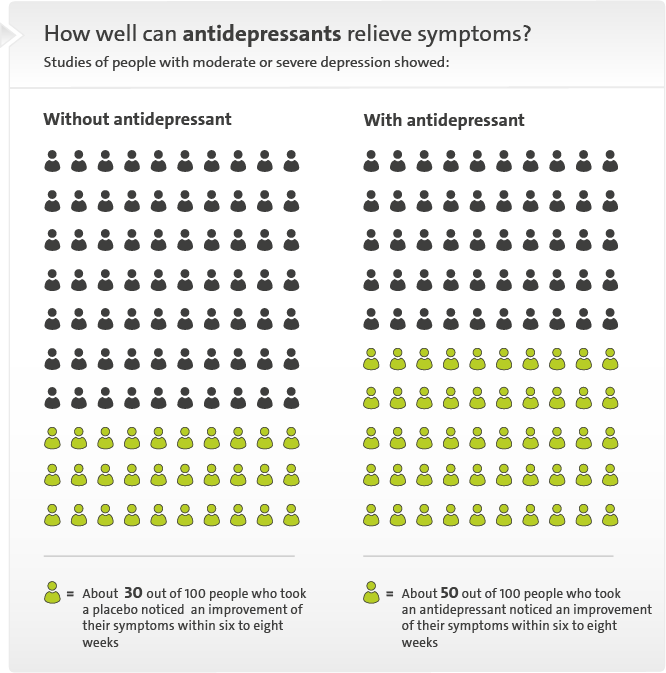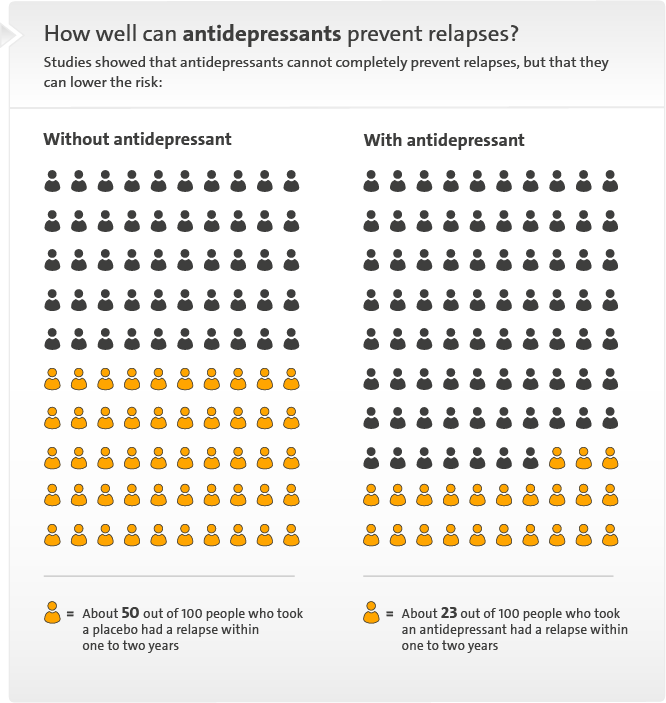Arroll B, Elley CR, Fishman T et al. Antidepressants versus placebo for depression in primary care. Cochrane Database Syst Rev 2009; (3): CD007954.
Barbui C, Cipriani A, Patel V et al. Efficacy of antidepressants and benzodiazepines in minor depression: systematic review and meta-analysis. Br J Psychiatry 2011; 198(1): 11-16, suppl 11.
Barbui C, Esposito E, Cipriani A. Selective serotonin reuptake inhibitors and risk of suicide: a systematic review of observational studies. CMAJ 2009; 180(3): 291-297.
Bundesärztekammer, Kassenärztliche Bundesvereinigung (KBV), Arbeitsgemeinschaft der wissenschaftlichen medizinischen Fachgesellschaften (AWMF). Nationale Versorgungsleitlinie Unipolare Depression. AWMF-Registernr.: nvl-005. 2022.
Davies P, Ijaz S, Williams CJ et al. Pharmacological interventions for treatment-resistant depression in adults. Cochrane Database Syst Rev 2019; (12): CD010557.
Fergusson D, Doucette S, Glass KC et al. Association between suicide attempts and selective serotonin reuptake inhibitors: systematic review of randomised controlled trials. BMJ 2005; 330(7488): 396.
Fournier JC, DeRubeis RJ, Hollon SD et al. Antidepressant drug effects and depression severity: a patient-level meta-analysis. JAMA 2010; 303(1): 47-53.
Gartlehner G, Gaynes BN, Amick HR et al. Nonpharmacological Versus Pharmacological Treatments for Adult Patients With Major Depressive Disorder. 2015.
Gartlehner G, Hansen RA, Morgan LC et al. Second-generation antidepressants in the pharmacologic treatment of adult depression: an update of the 2007 comparative effectiveness review. 2011.
Geddes JR, Carney SM, Davies C et al. Relapse prevention with antidepressant drug treatment in depressive disorders: a systematic review. Lancet 2003; 361(9358): 653-661.
Hetrick SE, McKenzie JE, Cox GR et al. Newer generation antidepressants for depressive disorders in children and adolescents. Cochrane Database Syst Rev 2012; (11): CD004851.
Institute for Quality and Efficiency in Health Care (IQWiG, Germany). Bupropion, mirtazapine, and reboxetine in the treatment of depression: Final report; Commission A05-20C.2009.
Institute for Quality and Efficiency in Health Care (IQWiG, Germany). Selective serotonin and norepinephrine re-uptake inhibitors (SNRI) in the treatment of depression: Final report; Commission A05-20A. 2009.
Linde K, Kriston L, Rücker G et al. Efficacy and acceptability of pharmacological treatments for depressive disorders in primary care: systematic review and network meta-analysis. Ann Fam Med 2015; 13(1): 69-79.
Rayner L, Price A, Evans A et al. Antidepressants for depression in physically ill people. Cochrane Database Syst Rev 2010; (3): CD007503.
Van Leeuwen E, van Driel ML, Horowitz MA et al. Approaches for discontinuation versus continuation of long-term antidepressant use for depressive and anxiety disorders in adults. Cochrane Database Syst Rev 2021; (4): CD013495.
IQWiG health information is written with the aim of helping people understand the advantages and disadvantages of the main treatment options and health care services.
Because IQWiG is a German institute, some of the information provided here is specific to the German health care system. The suitability of any of the described options in an individual case can be determined by talking to a doctor. informedhealth.org can provide support for talks with doctors and other medical professionals, but cannot replace them. We do not offer individual consultations.
Our information is based on the results of good-quality studies. It is written by a team of health care professionals, scientists and editors, and reviewed by external experts. You can find a detailed description of how our health information is produced and updated in our methods.



